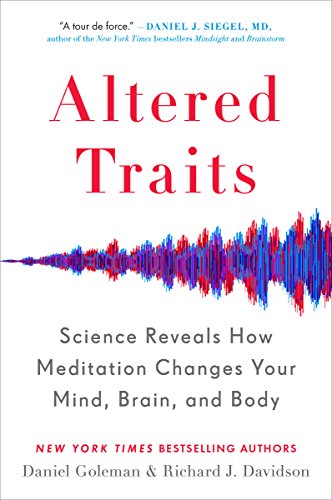Altered Traits is a book authored by Daniel Goleman and Richard Davidson, which examines the science behind meditation and its radical effects on the brain. The authors assert that beyond the commonly assumed effects of relaxation and stress reduction, meditation can fundamentally change our brains and help us lead more fulfilling lives. This blog post details the ten most important lessons from Altered Traits that can help people achieve a better understanding of the essence of meditation.
“The more we practice and improve our capacity for mindfulness and compassion, the more we can change our brains to support positive thoughts, feelings, and actions”
Lesson 1: The definition of mindfulness
Mindfulness is the foundation of meditation practices. The authors define mindfulness as paying attention to the present moment non-judgmentally. One can focus on breath or simply be aware of the environment around themselves. It leads to increased clarity, relaxation, and focus.
Lesson 2: Mindfulness meditation can change a person’s brain
The book claims that mindfulness meditation can transform neural circuits and support the brain’s capacity for resilience, learning, and focus. MRI studies of the brain show that regular mindfulness meditation practices can result in increased thickness of the prefrontal cortex, which enables better cognitive abilities, emotional regulation, and self-control.
Lesson 3: Different forms of meditation have different effects
Altered Traits demonstrates that various meditation styles result in varying outcomes. Attention-focused meditation can improve visual acuity, impulse control, and awareness of thought patterns, while practitioners of loving-kindness meditation show improvement in empathy and social connectedness. Body-scan meditation can help achieve physical and emotional relaxation by focusing attention on different regions of the body.
Lesson 4: Meditation can help manage depression and anxiety
Goleman and Davidson demonstrate how meditation can diminish the severity of multiple psychological disorders such as anxiety, depression, and stress. Studies suggest that regular meditation can reduce anxiety and depression symptoms by up to 40%.
Lesson 5: Practice intensity impacts outcomes
Altered Traits affirms that increased practice time and intensity can result in more profound effects on a person’s cognition and psychic wellbeing. A study of subjects who practiced three seven-hour meditation sessions a day for three months showed that they achieved remarkable results in attention, behavior, and well-being.
Lesson 6: The importance of a teacher
The authors convey the importance of a mentor or teacher to meditative practices. A teacher is an enlightening guide who can provide feedback, support growth, and enhance the learning process.
Lesson 7: The combination of different meditation styles
Goleman and Davidson argue for the advantage of practicing multiple styles of meditation concurrently. The mix can lead to a comprehensive approach to self-awareness, enhance one’s cognitive ability, and alleviate major limitations that come with the monotonous practice of a single type of meditation.
Lesson 8: Meditation and creativity go hand in hand
Meditation can expand the mind’s capabilities to adopt creative and innovative solutions to problems. Innovators and creative geniuses often practiced meditation, and the activity boosts innovation and ideation processes leading to creative problem-solving.
Lesson 9: Meditation is possible at work
The book acknowledges the impossibility of some individuals finding time to meditate. To address this, Altered Traits introduces the concept of “micro-meditation,” short sessions of meditation executed under professional circumstances.
Lesson 10: The continuous practice of meditation
Finally, the most crucial point, according to the authors, is that the synergy of different meditation practices and the combination of an expert teacher can capacitate an individual to deepen their understanding of meditation. And the practice of meditation must continue to empower individuals with the benefits of meditation.
Conclusion
Altered Traits profoundly reimagines the effect of meditation on the brain, revealing methods and practices that can confer notable improvements. Each of these ten lessons has a pivotal role in igniting the benefits embedded in mindfulness meditation. The flexibility of different forms of meditation enables practitioners to select a type that suits their personal goals and cognitive abilities. With a teacher’s guidance or an application’s support, even individuals with busy schedules can reap the benefits of meditation at any time of the day.

Altered Traits: Science Reveals How Meditation Changes Your Mind, Brain, and Body
Daniel Goleman, Richard J. Davidson



